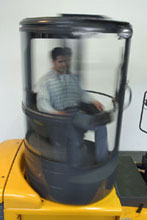 The EFG D30. |
Red Australia Equipment Pty Ltd is the first Australian distributor to take delivery of an electric four-wheel counterbalanced forklift with a rotating cabin.
Last month, Sydney-based Red imported a Jungheinrich EFG D30 forklift, which Red national marketing assistant Leonie Laarhoven said had already been sold.
She said safety concerns had increased demand for rotating cabs in Australia.
"We have had significant inquiries in Australia, mainly from companies" that wanted to reduce high injury rates and others that place a high value on safety, Laarhoven said.
Red has 18 Australian branches and is one of Sumitomo Corp of Japan's 720 worldwide subsidiaries.
Manufactured in Hamburg, the three-tonne capacity forklift's rotating cab can be adjusted from 30 degrees to the left to 180 degrees to the right.
The EFG D30, based on the Jungheinrich EFG 425-430, is designed to improve visibility, efficiency and ergonomics. A Jungheinrich UK specifications sheet said back injuries resulted in annual non-productive costs of up to EUR7 billion (USD8.9 billion) across the European materials handling industry.
It said the rotating cab increased efficiency when reversing and mitigated back strain. "Instead of twisting and turning, the driver can revolve," the spec sheet said.
Perth-based Curtin University of Technology occupational & environmental health lecturer Darren Joubert said forklift drivers' awkward posture increased injury risk.
"The rotating cabin in the new model Jungheinrich EFG D30 looks to be a useful addition to control and reduce some of the ergonomic risks by allowing drivers to move and rotate the cab for better vision during loading and offloading."
Joubert was concerned the Jungheinrich spec sheet did not have exposure levels to reduce whole-body vibration.
The forklift weighs five tonnes (including battery) and travels up to 20kph, laden or unladen. It has efficient handling turnover rates due to its peak values for acceleration, travel and lifting, Jungheinrich's specs sheet said.